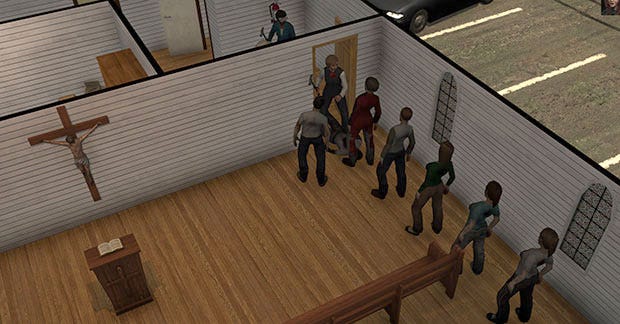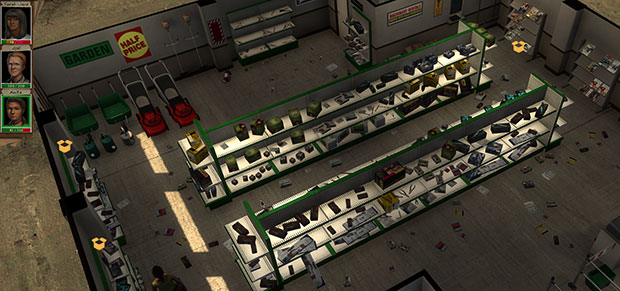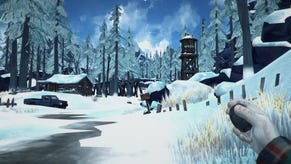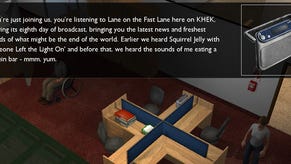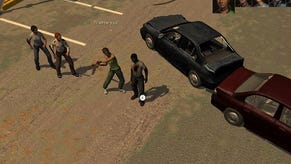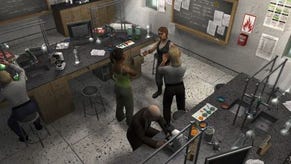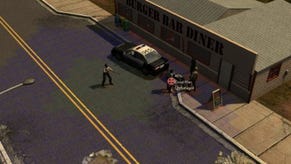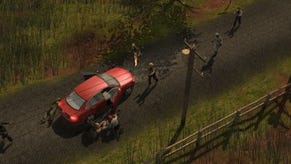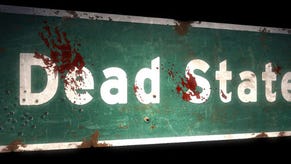Wot I Think - Dead State: Reanimated
Six Months Later
I'd been wanting to check out Doublebear's Dead State - which I'm going to loosely label 'The Walking Dead does X-COM' - for a while, but Wot I Thinkery fell to someone else upon its initial release. The free 'Reanimated' update is a fancy name for a mega-patch designed to address assorted gripes about the doomy turn-based strategy/RPG zombie survival game, and also my opportunity to finally visit the blighted town of Splendid, Texas.
I should point out that this is my first experience of Dead State, so I'm about as much use as a band-aid on headshot when it comes to identifying whether the new and changed features are improvements or not. I know there are a raft of new difficulty options to keep the hardcore or the over-familiar engaged, but frankly the last thing I'd want to do right now is make Dead State any more punishing. What I'm looking at is whether Dead State: Reanimated is a game fellow first-timers should play or not.
Broadly, the answer to that is 'yes.' But I'd stay your hand before you opened your purse, look you in the eyes with infinite solemnity and say 'wait. There's something you should know.' I'll describe Dead State quickly first, though. You have a base, which is a school in various states of disrepair, and whose rooms can only be built or fixed with resources obtained from the world outside, which is packed with zombies and murderous survivors. So you send your character and up to three allies into the field, where they move in real-time until they get into a fight, at which point the game shifts into X-COM- or Fallout-style turn-based battles. In between this stuff, you try to manage the physical and mental well-being of your growing (and sometimes diminishing, if you're inept or unlucky in fights) band of survivors.
There are loose goals, but primarily it's about about discovering (and surviving) locations around you through an ever-widening circle of exploration across a big Texan map (comparable in size and locales to early Fallouts, though don't expect quests or chats at any of your stop-offs) which becomes more manageable if and when you find faster modes of transport.
The plot is basically 'survive', but small story beats offering crises and new characters pop up as time wears on, some of which are scripted and some of which are reactive to the status of your fellow survivors. Because almost anyone can be infected, perma-killed or in some cases sent away, the shape of your group is never certain, so though the essential structure is the same from game to game, the vignettes within it will differ.
There's a lot going on, and the game is impressively unmerciful too, as befits its scenario. Dead State is an extremely well-observed apocalypse survival RPG, but unfortunately it's also irritating, both on a structural level and in how its combat works. The former relates to grind, and in fairness it is only thematically appropriate that survivors of an infection-shattered world would have to scrape out a subsistence life, foraging constantly for food and other resources, but is this 'fun'? We're in similar territory to This War Of Mine, which is also primarily a scavenger hunt with the purpose of building up and maintaining a safe-ish shelter. But that is a message game, using the grim repetition of its away missions and parts-collection to sell us on the idea that civilian life in wartime is hell. Can Dead State really make similar claims about its fantastical theme?
In any case, the issue for me is more that the grind here is too mechanical rather than that it's there at all. For instance, to build a science lab or an infirmary requires a fixed number of 'parts', which almost always entails multiple trips into the field, from which only a handful of objects specifically labelled 'parts' can be used as parts. All those doors and walls and car shells and windows and wooden pallets and metal barrels and light fittings and furniture littering the streets and structures you visit? Not 'parts'. Don't touch.
So you repeatedly throw your people into danger on these desperate trips into small Texan city-fragments, filled with zombies and looters, in the name of finding the 40 'parts' which will let you build the infirmary. Until you have that infirmary, no-one will try to heal anyone else's horrific injuries, despite all the bandages and painkillers you do have kicking about, so survival becomes a war of attrition, taking increasingly near-dead units out into the field and hoping you luck or savescum your way into a relatively clean run. I realise it's all in the name of being a survival fantasy rather than a power fantasy, but I do feel this could have been presented more believably.
The key problem with Dead State: Reanimated, for me, is that it is a prix fixe menu. You're supposed to be allocating jobs to the various other survivors who fetch up in the huge school you're using as a shelter, but until you have exactly 40 parts for this or that room, they can't even start building it. Despite various dialogue stressing the importance of everyone mucking in, most of your workers idle, waiting for you to get back with more, only to usually find that jobs still can't get done because the only claw hammers you had are stuck in the inventories of those who joined you on the last mission, and you can't even look at said inventories until you're back out in the field.
This leads to a whole lot of inventory Tetris, manually shuffling specific items from your crew to yourself, and then from yourself to the shared storage in the base, and all the while you're thinking "man, wouldn't they have at least tried to build a rudimentary infirmary to try and do something about all these wounds, even though they only have 38/40 parts and no hammer?"
I don't have a proposal for what would make this system better, but all the time I played Dead State I struggled to reconcile a fantasy about carving out a makeshift existence on a fatal new frontier with this mechanical pursuit of construction material numbers. Both in its favour and against it is how harrowing the away missions required to obtain these resources are. Heading to a picnic site to grab some wood and fuel isn't a straightforward matter of 'walk over, shoot zombies, win'. It's this teeth-grinding exercise in fear, trying to grab resources without being seen or heard, then trying to pick enemies off one-by-one rather than getting swarmed once you are inevitably spotted. There were areas I just cut and ran from, because I knew I'd be doomed if I ventured too far in.
A couple of zombies are manageable; four are generally not. More than one human 'looter', meanwhile, means serious trouble - they know how to use weapons, they can move further, they can summon their allies and they haven't been beaten down by raid after raid like your guys have. To borrow a well-worn metaphor, you are the walking dead here. Simply getting around a zone is gloriously tense, a delicate balancing act of greed and caution. Once a fight does begin, strict limits on your characters' action points, scarcity of ammo, unreliability of weapons, and risk of infection as well as death keeps it a fraught, scrappy brawl for survival rather than a coldly tactical war.
Dead State does desperation very well: at any moment, I felt a hair's breadth from tragedy. I heard some gripes about enemy AI in the original version of the game, but apart from a couple of instances of multiple foes getting bunched up in doorways, they seemed as relentless and deadly as I would need or expect them to be.
Due to your gang's fragility, this is not a game in which you are expected or even encouraged to kill everything - in fact, if you get into a fight at all, you might just have done the stupidest thing you possibly could. Sadly, the noise detection system is far too rudimentary and there's a total lack of any stealth option. Fair enough, it's not Invisible, Inc, but the option to quietly grab something from a shelf when a guard is looking the other way is conspicuous by its absence from a game which repeatedly advises quiet. As is - and oh God, I'm doing If Only You Could Talk To The Monsters - the option to engage most other humans in dialogue.
Dead State posits that, come the post-apocalypse, whatever's left of humanity will immediately turn aggressively tribal - a familiar trope, and one which asks you to perform your own moral balancing act about the lives you're taking rather than being preachy about it. But...straight-up murdering half a dozen guys because it's the only way to see what's in their picnic hamper feels monstrous when you've not even had a chance to ask first. That the enemy always gets to move (and attack, if they can get within range) first once you're spotted makes it feel unfair too, especially as a rigid character turn order will see control of whichever survivor you were controlling in real-time ripped away in favour of someone who's six steps away from the gun-toting maniac you'd just engaged.
Almost all dialogue happens back at base, where your gang of survivors - the majority of whom can be perma-killed in the field - primarily offered looped requests or setpiece panics. There are little human dramas to make decisions about, and a slow-burn of managing a team with different motivations - the pragmatic mechanic, the TV preacher who may or may not be more interested in converting the survivors than he is keeping them alive, the student vet who isn't comfortable with becoming the shelter's de facto doctor - and these are appropriately agonising.
The writing's sharp, the decisions nuanced, the scenarios less contrived and violence-inclined than assorted mediums of The Walking Dead tend to be, the slow growth and improvement of your ant's nest of a shelter satisfying to see. There's so much going on, slowly, with a trickle of new survivors helping keep status quo at bay and changing how you feel about your group. Little people, their lives in your hand.
Unfortunately, having to (for example) supply Joel with an endless supply of hot sauce to help keep his spirits up kicks this humanity back into roboticism. Every character has a luxury item they will ask for again and again - you wonder why, after four consecutive bottles of hot sauce, Joel doesn't feel in the mood for mayo instead. Meanwhile, Morale itself is a global statistic, affected by a huge grid of factors - everything from food availability to if the toilets work and if the cupboards are stocked with antibiotics. Everything is a drain on it, including if a character is merely feeling 'OK', and the mathematical breakdown of exactly what's contributing to it at the end of each in-game day does reveal a statistical Oz behind the curtain of humanity.
I think that's the fundamental issue holding Dead State back from the greatness it often threatens: it's trying to be a management game and a roleplaying game and a strategy game, and (perhaps because its origins are fairly humble) it winds up compromising on each of those. I wish it felt more organic, that those terrifying forays into a hostile world had more pay-off than an incremental number adjustment, that not having exactly the right amount of parts didn't result in a half a dozen people sat around the last refuge at the end of the world with nothing to do.
I do like it, though. Quite a lot more so than this piece probably suggests, and that's because it's a game which is far more successful in theme and tone (harder to convey in text) than it is in features. Getting through another day feels meaningful despite the barrage of numbers and the parroted lines. Fights are chilling, flexible and unpredictable rather than perfunctory. Error is a result of your choices rather than an enforced event. The wider world is a sinister, uncharted mystery, with your never quite knowing what's out there until you encounter it. Decisions are painful. People are problematic. Murder feels bad. The downbeat prettiness of its world is littered with small details, hints of the communities that once were and the fearful squatters that have replaced them.
In terms of recreating the second act of an ... of the Dead or 28 x Later film, that point where the world has fallen, scattered survivors have found shared refuge and now they need to take risks to maintain it, Dead State is probably as close as we get. I would say that Dead State probably has too many parts and doesn't quite know how to fit them all together cleanly, but it just about manages to be more than the sum of them.
